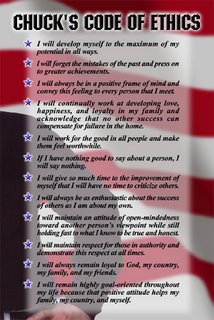Some friendly advice from Mr. Norris
 “I will maintain an attitude of open-mindedness toward another person’s viewpoint while still holding fast to what I know to be true and honest.”
“I will maintain an attitude of open-mindedness toward another person’s viewpoint while still holding fast to what I know to be true and honest.”I was struck by the truth and beauty of Chuck Norris’s Code of Ethics and decided for a bit of a change of pace today. Inspired by Mr. Norris, whose code is also my computer’s background, I wanted to take a few moments of your time to discuss the three most important virtues in considering others: respect, reflection, and care. I’ll take each in kind.
Respect
As many of you are aware, I am a big fan of C.S. Lewis. In “The Weight of Glory”, a beautiful essay, he reminds the reader that he has never met a “mere mortal” or “an ordinary person.” Stating it in his simple, yet regal prose: “It is immortals whom we joke with, work with, marry, snub and exploit.” We are immortals in a temporary world (not in the Highlander sense, but the Christian one). Next to the Eucharist, the holiest object that you will ever encounter is your neighbor.
From this, we are called to approach each other seriously. Our interactions are not meant to be deathly grave, however. As Lewis put it, we must play and experience that “highest form of merriment.” That being said, I believe we can properly position ourselves in this discussion.
It is unwise, borderline sacrilegious, to treat others flippantly. This is probably one of the more difficult challenges that we face as humans because it is so easy to forget, especially when confronting someone that we don’t particularly like. As difficult as this may be, it does not excuse use from answering that call.
It also means that Chuck Norris is immortal.
Reflection
My senior year at Providence, I was lucky enough to stumble (quite literally at times) into a philosophy course taught by Dr. Matt Cuddeback. One day while discussing Kant, he fell into a tangent on the importance of words. Even the most basic word has a precise meaning that is unique to itself. In sports, an example would be the difference between ‘quick’ and ‘fast’. The legal equivalent is the difference between ‘not guilty’ and ‘innocent’.
The benefit of this is that it means that we are able to clearly state what we mean. We’ve been blessed with the opportunity to precisely translate our ideas into words that we can share with others. I’m sure that you already have spotted the problem that it creates. Since there is such great precision available to us, we must always be careful with the words that we choose. When taken with Lewis’s words of caution above, it becomes utterly important that we take that care. If we fail to, then we run the risk of being disingenuous with our fellow man. After two years of law school, I’ve come even more to appreciate the importance of taking time to reflect on what I say before I say it and even more time when I commit it to paper.
For these reasons, Chuck Norris doesn’t use words. He relies on roundhouse kicks to let people know what he’s trying to say.
Care
I hated “The Great Gatsby”. Among most students at Hendricken, I don’t think that I was alone in that feeling. As with so many revelations in my life, my opinion changed on the book while at PC. The Other Dr. Esolen summed up the book perfectly: the difference between Jay Gatsby and every other character in the novel is that Gatsby is a careful man. He wasn’t careful in the sense that he was cautious. He was careful in a way that showed concern for those around him. This is the great revelation that Nick Carrway experience at the end of the book – the difference between a good person (Gatsby) and a bad (just about everyone else) is the ability to care about others.
This is important to the present discussion because it highlights my previous two points. If you’re a careless person, you will fall into the same trap that snared Gatsby’s Daisy. We all have troubles. They could be worries about school, money, or polar bear attacks. As Chiclet has so aptly pointed out, it is easy to be consumed by our own small worries, especially those that we create within ourselves. But if we find ourselves so wrapped up in our own worries, to the point where we are unable to find joy in our mingling, we are unnecessarily denying ourselves the satisfaction of companionship. This is one of those virtues where it’s more than just a law that you should obey; obedience, here, will actually enrich our lives.
Of course, Chuck Norris doesn’t have worries about trivial things like polar bears or taxes.

2 Comments:
Amen, brother. One of your best posts, Iconoclast--
And, as a wise man once said,
"It was once believed that Chuck Norris actually lost a fight to a pirate, but that is a lie, created by Chuck Norris himself to lure more pirates to him."
Thanks, Lisa. Your support on this post means a lot to me.
Post a Comment
<< Home